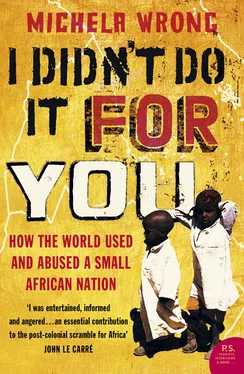1 ...7 8 9 11 12 13 ...25 Massawaâs capture left Italy in control of a stretch of the coast. But with their men succumbing to heatstroke, typhoid and malaria, the Italians knew the boundaries of their fledgling colony would have to be extended into the cool, mosquito-free highlands if it was ever to amount to anything. They began edging their troops up the escarpment, claiming lowland towns whose chiefs had little love for Ras Alula, Emperor Yohannesâ loyal warlord and ruthless frontier governor. It was at a spot called Dogali, 30 km inland, that Alula decided to draw a line in the sand in 1887, his warriors virtually wiping out an advancing column of 500 Italian troops. But, distracted by a major Dervish attack, Yohannes was in no position to press home his advantage. When the Abyssinian emperor was killed in battle and the Abyssinian crown claimed by his rival to the south-east, the King of Shewa, the Italians seized the opportunity to scale the Hamasien plateau, marching to Asmara and into the highlands of Tigray.
The colony baptized âEritreaâ after Erythraeum Mare â Latin for âRed Seaâ â was beginning to take shape, and in the capital Massawa, Italian administrative offices sprang up alongside the classical Turkish and Egyptian buildings. Backed by King Umberto, always one of Italyâs most enthusiastic colonialists, the government initially entrusted the territory to Antonio Baldissera, a general with a reputation for ruthlessness. Registering that Italy could not afford to keep a standing army in Eritrea, Baldissera turned Massawa into a military recruitment centre for what he referred to as âthe inferior racesâ. Stripped of farming land by their new rulers, Eritrean youths had little option but to sign up as ascaris , ready to fight Romeâs colonial wars at a fraction of the price of an Italian soldier.
Romeâs primogenito , its colonial first-born, was hardly the earthly paradise parliament â deliberately kept in the dark by both King and cabinet â had been led to expect. This was a military regime built on bullying and fear. Playing a clumsy game of divide and rule, in which he tried to turn local chieftains against the new Emperor of Abyssinia, Menelik II, while professing eternal friendship, Baldissera filled Massawaâs jail with suspected traitors and would-be defectors. When his officers met resistance, they resorted to enthusiastic use of the curbash , a whip made of hippopotamus hide that flayed backs raw. But the Italian public would have remained blithely unaware of the true state of affairs, had it not been for a scandal that exploded in the press in March 1891.
Ironically enough, the controversy was triggered by the government of the day. It had grown uneasy at what it was hearing from Massawa, where a formerly trusted Moslem merchant and a tribal chieftain had been sentenced to death for treason. Smelling a rat, Rome ordered an inquiry into the activities of Eteocle Cagnassi, Eritreaâs secretary for colonial affairs and Dario Livraghi, head of the colonyâs native police force, who promptly fled. From exile in Switzerland, Livraghi penned a detailed confession, which he sent to a Milan newspaper. Just why the police chief should choose to thus expose himself remains unclear. But the editors of Il Secolo were so alarmed by Livraghiâs account, they ordered their journalist on the ground to carry out his own investigation before they dared print a word. His findings caused a sensation.
Rich Eritrean notables, including respected holy men, were regularly disappearing at night, never to be seen again. Their fate was an open secret in Massawa, reported journalist Napoleone Corazzini. Arrested by Livraghiâs policemen, they were being shot, clubbed and stoned to death and immediately buried in shallow graves on the outskirts of town. Others had been tortured to death in prison, arrested not for genuine security reasons but because corrupt Italian officials were greedily intent on confiscating their assets. Lists of intended victims had been found in Cagnassiâs office and Livraghi had personally carried out many of these extrajudicial killings. Corazzini, something of a tabloid hack, painted a grotesque scene: a Moslem cleric begging for mercy before a freshly-dug grave; Livraghi, cackling like a maniac, firing repeatedly into the old man; the police chief smoking calmly as the pit was filled and finally trotting his horse cheerfully over the mound to ensure the earth was packed nice and tight.
Having published Corazziniâs account, the newspaper felt it was safe to run Livraghiâs story, which presented an even grimmer picture. On top of what the journalist had described as âroutine assassinationsâ, the Italians were using terror to keep locally-recruited Eritrean warriors loyal to the new colonial regime. Officially, suspected waverers were led to the border with Abyssinia and âextraditedâ. In fact, Livraghi revealed, they ended up in mass graves, slaughtered on the orders of Massawaâs military command. At least 800 ârebelsâ had been killed in this way, sending a blood-curdling lesson to anyone thinking of following their example.
For decades, a barely-interested Italian public had lazily taken it for granted that Italy was doing good in Africa, its enlightened administrators lifting a heathen people out of the primeval slime. The Massawa scandal exposed colonialism at its most bestial. With every day that passed, new revelations about life in Eritrea â including a shocking account of how Italian officers had jokingly drawn lots for the five attractive widows of a murdered victim, then carted them off by mule â were being published in the press. Ordinary Italians were beginning to wonder why so many soldiersâ lives had been lost setting up a colony in which atrocities were apparently commonplace. The newspapers demanded an investigation, reluctant to believe their own articles. Aware that its fledgling African policy faced a test more dangerous than any military confrontation, Rome announced the establishment of a royal inquiry. And this was where Ferdinando Martini, ruthless humanist, pragmatic sophisticate, the iconoclast who ended up saving the establishment, entered the picture.
The son of a comic playwright, Martini came of aristocratic stock. He was born in Florence, a city whose inhabitants regarded themselves, in many ways, as guardians of Italian culture. As a liberal member of parliament for the Tuscan constituency of Pescia and Lucca, he was to be returned to parliament a total of 13 times. By the time the old magic finally failed and he lost his seat, held without interruption for 45 years, he was 77 years old and inclined to regard retirement as a blessing. But any 19th-century gentleman worthy of the title prided himself on being a polymath and, for Martini, a political career always went hand-in-hand with literature. Following in his fatherâs footsteps, he was to produce a steady stream of light comedies, erudite speeches and witty articles, taking time out from the political manoeuvrings and backroom bargaining associated with Montecitorio, the parliament in Rome, to run and edit several literary newspapers.
When it comes to history, those who write with ease enjoy an unfair advantage over ordinary mortals. They may be slyly self-promoting or subtly manipulative without us fully realizing it. Time has placed forever out of reach the ultimate litmus test, in which we hold their version of events up against our own memories and spot the inconsistencies. Because their words are what the records retain, because the gaps in their accounts left by the embarrassing and discreditable cannot always be filled, we see them largely as they intended to be seen.
No politician ever mastered his own legacy more effectively than Martini, thanks to the huge body of work he left behind. This was someone who felt compelled to put pen to paper every day, even if it was only to record a mocking paragraph in his diary or dash off an affectionate note to his daughter. The screeds of elegant copperplate draw the portrait of a man both irreverent and perceptive, capable of acknowledging his own failings while deriving huge amusement from those of others. They chime with the posed portrait photographs which show the author, eyebrows raised, high-domed head tipped quizzically to one side, challenging the camera. âHe is balding, and this bothers him,â reads the entry in a light-hearted biographical dictionary of the day. 5 It describes an acid-tongued perfectionist, who liked to boast that his intellectual independence had won him the enmity of every political party. âHe is blessed with an incisive mind and a lively turn of phrase. But if he judges others harshly, he is no less exacting with himself.â Martini comes across as a charismatic maverick, hard to dislike, a fact that makes his unexpected role as apologist for white supremacy all the more insidious.
Читать дальше












